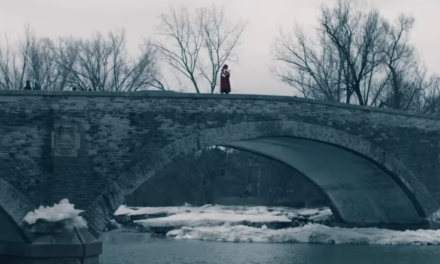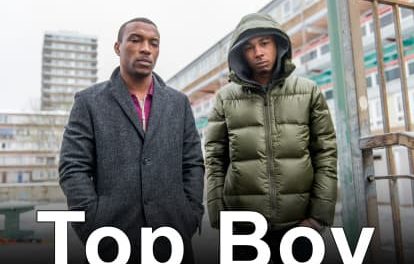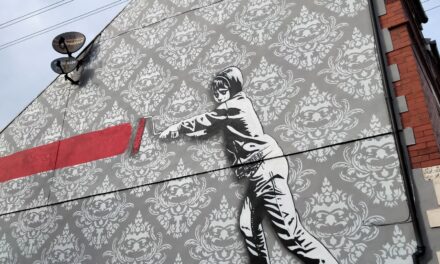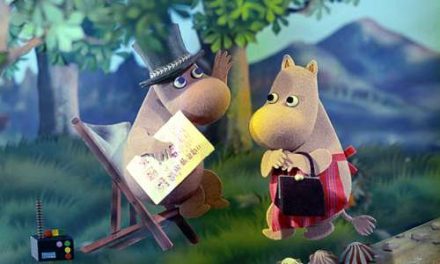Watching the seventeenth series of Big Brother UK, broadcast on Channel Five this summer, and perusing the headlines about the show which proliferate on news sites like Metro, the Mirror and Mail Online, one could be forgiven for forgetting that in 2010, Big Brother UK, the reality television phenomenon of the twenty-first century, was pronounced dead.
After ten years of Big Brother on UK screens, Channel 4, the programme’s then-broadcaster had made the decision to cease broadcasting the Endemol-produced format. In a promotional trail advertising what was thought to be Big Brother‘s final ever series in Britain, a collection of former winners and other well-known housemates dressed in mourning, were shown dancing around a grave to a jazz-inflected rendition of the Big Brother theme tune, as the show’s narrator, Marcus Bentley, clad in priest’s robes, read a eulogy to ‘Big Brother of ours’ in his recognisable Geordie drawl. In place of a coffin, the show’s first two UK winners, Craig Phillips and Brian Dowling, lowered the iconic diary-room chair into the ground.
This carnivalesque dissolution of Big Brother‘s ‘funeral’ into a high-energy celebration, would have been a fitting send-off for a show which has always occupied a fault-line in relation to notions of (im)propriety in British broadcasting. Since its inception on UK screens in 2000, Big Brother has been discussed as both a lowest-common-denominator ‘freak show,’ and as a democratic triumph which has brought visibility, and often celebrity status, to diverse range of ‘ordinary’ people traditionally excluded from the world of television, and enabled audiences to connect with a spectrum social issues through the tropes of emotion, the ordinary and the everyday attached to the Big Brother format.
By the end of its run on Channel 4, Big Brother had been steadily dropping ratings year-on-year. The 2009 series averaged at 2 million viewers, a stark decline from the highs of seven to ten million viewers the show had boasted between 2000 and 2007. Yet, Big Brother was to live on, and was quickly snapped up by rival broadcaster Five. However, rather than rising from the ashes of its former glory, and reinventing itself in its new home as newly relevant TV event to take over the schedules and the popular imagination as it had in years-gone-by, Big Brother has staggered on in a kind of identity-confused half-life, as it struggles to compete in a changing reality TV landscape.
To the casual observer, Big Brother’s current guise may seem little-changed from its previous existence: people sitting around in a confined space as they gossip, bitch and argue about and between one another, or offer up confessional moments, discussing their thoughts and feelings with the disembodied voice of the omniscient Big Brother in the iconic diary room. Yet, as someone who has spent the last three years writing a PhD on British reality TV, watching hours of classic Big Brother footage right from its first series in 2000, I have been struck by how many of the fundamental ‘rules’ of the show have steadily dissolved during the show’s time on Channel Five. By this, I don’t mean by formal rules of the televised competition, but the ways in which many of the discourses and ideas about reality TV, celebrity and the ordinary which have traditionally structured Big Brother have given way to make manifest a more porous and unstable reality format which seems in the midst of an identity crisis, as the show attempts to remain relevant in the contemporary reality television marketplace.
Foremost, Big Brother has traditionally been invested in reproducing a distinct divide between the ‘ordinary’ person and the media world in which they find themselves during (and often after) their time on the show. Central to the show’s claims to ‘reality’ has been that housemates are not media professionals and have no previous experience of being in front of the cameras. One of the core pleasures of Big Brother has always been watching ‘ordinary’ people perform their apparently ‘real’ or ‘authentic’ selves for public consumption.
Of course, this has always entailed the paradoxical expectation that these authentic performances are suitably telegenic and entertaining. In relation to the latest series, however, the notion that Big Brother housemates should be ‘ordinary’ people untouched by the bright lights of the media world appeared to have been abandoned as it featured a number of participants who have previously appeared as recurring cast-members on other reality shows: Lateysha Grace, who was a central cast-member of MTV’s The Valleys for three seasons before it was axed, Alex Cannon from the MTV show Judge Geordie, Georgina Cantwell who starred in the E4 reality soap Taking New York in 2015, and Ryan Ruckledge who has appeared on the X Factor. Other housemates included the son of the celebrity chef Marco Pierre White, and a BBC journalist.
Perhaps, with so many reality shows currently in circulation, it is now unrealistic to expect Big Brother participants to have no connection to other programmes, or the media world in general. Yet, the fact the its casts’ previous reality careers have been undiscussed within the series (likely a condition of their contracts), suggests that Big Brother is aware of the uneasy line it now straddles in relation to the amateur/professional performer status of many of its cast-members. In a crowded reality TV landscape, however, the show no doubt wanted to ensure that at least some housemates had existing experience in ‘performing’ for the cameras, which raises questions about how a show, which has always laid claims to democracy in the open-call style of its audition process, has gone about soliciting its current crop of participants.
This partial dissolution of the boundary been media and ordinary could, in addition, merely be Big Brother transforming with the changing status of reality TV itself in contemporary British society. In a context in which reality programme is ubiquitous, being on reality TV perhaps no longer designates an individual as inherently special or different in the manner in which it used to. Indeed, many of the other housemates claimed to be involved in not dissimilar kinds of performative labour, as models, DJs and nightclub hostesses. Rather than occupying a separate, rarefied media realm, reality TV may now occupy the more visible end of a continuum of labour based on surveillance, performance and self-display, which has become increasingly naturalised as a means of generating capital for young people in a conjuncture of economic austerity and precarity.
Moreover, during the launch night episode of the 2013 series on Five, the introductory VTs broadcast to introduce each housemate contained snapshots from their public social media profiles on Twitter and Instagram, and the page on the Five website which details each of the housemates contains links to their Twitter feeds (most of which appear to be on hiatus, presumably due to the lack of internet in the Big Brother house). This active drawing upon the housemates pre-existing social media presence, positions appearing on Big Brother as merely a heightened version of the self-mediation which constitutes the day-to-day reality for almost all young people in contemporary Britain.
Indeed, the show appears to be attempting to speak more and more exclusively to a youth demographic. Youth were always a key market for Big Brother on Channel 4, but at the same time, the show has traditionally staked many of its public service credentials in the diversity of race, age, religion, sexuality and gender identity of its casts. On Channel Five, however, Big Brother has been increasingly cast like a more niche, youth-focused reality show such as MTV’s Geordie Shore or ITV2’s Love Island: offering a cast of almost entirely white, attractive, telegenic twenty-somethings. As the (now evicted) housemate Marco Pierre White Junior proclaimed of the BB 2016 cast, ‘We’re such a good looking house!’
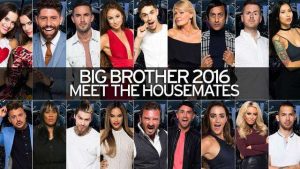
This is not necessarily meant that the last series was apolitical. Issues of racism and gay rights were debated through Big Brother’s established lexicon of high emotion and drama, of course. Yet, Big Brother seems to be gradually loosening its ties to its public service history on Channel 4, and seeking to align itself more closely with the kinds of niche, youth-oriented reality programming found on channels like MTV, E4, ITV2 and ITVBe. Not least, the 2016 series appears to have plundered the format of the MTV show Ex On the Beach. Where Big Brother has traditionally be invested in keeping housemates firmly shut off from the outside world and their lives there, this series contained two houses, one featuring the ex-partners and former friends of the participants in the other house, who have gradually been brought together with suitably volatile results. Moreover, visits from friends and family members have been offered to housemates as rewards for winning tasks.
‘This is not Big Brother!’ the Daily Mirror has quoted social media users as exclaiming in relation to this latter twist. In the midst of an apparent identity crisis, in which many of the foundational notions which structured the format for over a decade appear to be in flux, Big Brother shows that reality formats must shift and mutate to keep abreast of a dynamic, contemporary reality TV market. Yet, while Big Brother may not be dead, I can’t help but feel it lives on as a kind of TV zombie, staggering towards a demise which cannot be too far on the horizon.
Michael Lovelock is a PhD Candidate at the University of East Anglia. His thesis explores the representations of LGBT identities in British reality television from 2000 the present. His research has been published in European Journal of Cultural Studies and the Journal of Gender Studies.


